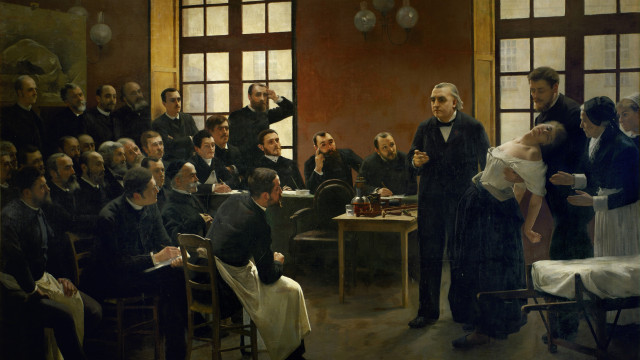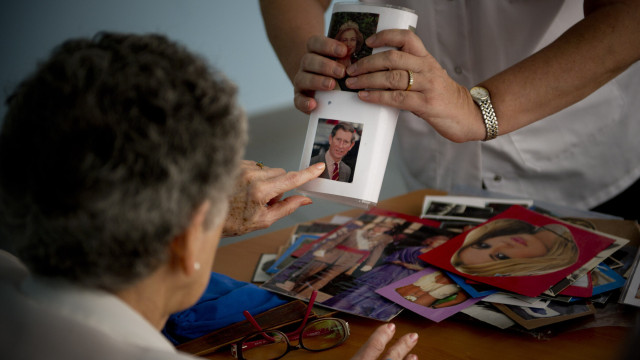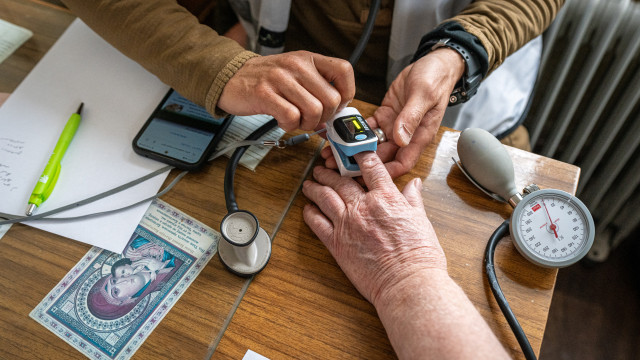






























See Also
See Again
© Shutterstock
0 / 31 Fotos
What is it?
- Obsessive love disorder (OLD) is a condition that causes you to become fixated on someone you believe you’re in love with. It goes far beyond the boundaries of a healthy relationship, and can become obsessive and controlling.
© Shutterstock
1 / 31 Fotos
Extreme emotions - Someone with OLD feels an intense need to protect the person they love. They might also feel the need to control them in order to keep them “safe,” or to quell their own feelings of jealousy and insecurity.
© Shutterstock
2 / 31 Fotos
An illness or a state of emotion?
- Obsessive love disorder is not classified as a distinct mental health condition in the DSM-5 (the Diagnostic and Statistical Manual of Mental Disorders). This is because there is still some debate as to whether it can be called a mental illness, but there are still clearly defined characteristics that point to this disorder.
© Shutterstock
3 / 31 Fotos
A serious condition
- Regardless of its official status, OLD is a serious condition that can drastically impact a person’s quality of life and ability to function. In some cases, the object of their fixation may also be at risk of stalking or harassment, particularly if the feelings aren’t reciprocated.
© Shutterstock
4 / 31 Fotos
OLD and other disorders
- Obsessive love disorder usually accompanies another type of mental illness such as borderline personality disorder or an attachment disorder.
© Shutterstock
5 / 31 Fotos
Help is available
- OLD can be a scary condition to live with or to observe in your loved ones. Speak to a doctor if you suspect that you are struggling with this. Treatment can help to reduce the symptoms and facilitate healthier relationships.
© Shutterstock
6 / 31 Fotos
What are the symptoms of OLD?
- Like many mental health conditions, the symptoms of obsessive love disorder vary greatly from person to person. Two people suffering from OLD may have very different experiences with the condition.
© Shutterstock
7 / 31 Fotos
Overwhelming feelings - Generally, someone with OLD will feel an overwhelming love and attraction for one person. They may think about that person obsessively. They may be in a relationship with that person or simply wish to be.
© Shutterstock
8 / 31 Fotos
Reduced ability to function - They are so overwhelmed with thoughts and emotions about this person that they struggle to go about their daily life and carry out their usual responsibilities.
© Shutterstock
9 / 31 Fotos
Constant contact and validation - It’s common to need constant validation and reassurance from the person they are in love with. This also ties in with the obsessive need to stay in contact. This means constant texts, phone calls, social media messages, etc.
© Shutterstock
10 / 31 Fotos
Lack of boundaries
- Someone with OLD is likely to disregard the personal boundaries of their beloved. This can be in relation to their time, physical space, social life, or work.
© Shutterstock
11 / 31 Fotos
Jealousy
- Jealousy is often another strong symptom. They can be extremely jealous when their partner/desired partner spends time with others, or feel suspicious of relationships they might have with others.
© Shutterstock
12 / 31 Fotos
Protection and control
- They also tend to feel an overwhelming need to protect the person they love from harm of any kind, but in combination with the intense jealousy this often leads to attempts to control them.
© Shutterstock
13 / 31 Fotos
Possessiveness
- They often feel extremely possessive of the other person’s time, space, and attention. Someone with OLD may feel the need to control their beloved's actions and behavior, such as where they go, who they see, and what they do.
© Shutterstock
14 / 31 Fotos
Low self-esteem
- If you have OLD, you are likely to suffer from low self-esteem, particularly when you feel that your love isn’t reciprocated.
© Shutterstock
15 / 31 Fotos
Social isolation
- It’s common to become isolated from friends and family because you only want to engage in social activities that involve the person you love.
© Shutterstock
16 / 31 Fotos
Rejection makes it worse - The symptoms of OLD often worsen if the person is rejected or the relationship with their beloved comes to an end.
© Shutterstock
17 / 31 Fotos
What causes OLD?
- As mentioned earlier, OLD is not officially classified as a mental health disorder, but is rather seen as a state of being. It is usually linked to a mental health disorder that influences obsession and dysfunctional relationships.
© Shutterstock
18 / 31 Fotos
Attachment disorders
- Attachment disorders are a group of mental health disorders that impact our emotional attachment to others. They can cause anything from a lack of emotion to an obsession.
© Shutterstock
19 / 31 Fotos
Attachment disorders
- Two examples include disinhibited social engagement disorder (DSED) and reactive attachment disorder (RAD). With DSED, the person tends to be overly friendly and have a lack of boundaries with strangers. With RAD, the person may find it difficult and stressful to form relationships.
© Shutterstock
20 / 31 Fotos
Childhood trauma
- They both present in childhood and are usually the result of abuse or negative experiences with parents or caregivers.
© Shutterstock
21 / 31 Fotos
Borderline personality disorder - Obsessive love disorder can also present with borderline personality disorder (BPD). This mental illness is characterized by issues with self-image, severe mood swings, and feelings of emptiness. Someone with BPD may swing between feeling obsessive love for someone and extreme disdain.
© Shutterstock
22 / 31 Fotos
Delusional jealousy
- Delusional jealousy is defined by an insistent belief in facts or events that have been proven to be untrue. When combined with obsessive love disorder, the person may believe that the object of their affection reciprocates their feelings, even if they have continuously stated otherwise.
© Shutterstock
23 / 31 Fotos
Obsessive jealousy - Obsessive jealousy, on the other hand, is a non-delusional obsession with your partner’s perceived infidelity. They may not believe in impossible scenarios, but still fixate on the idea that their partner is cheating on them.
© Shutterstock
24 / 31 Fotos
Obsessive compulsive disorder
- Obsessive compulsive disorder is a condition that causes a combination of obsessive thoughts and compulsive behaviors related to those thoughts. Some people find that their romantic partner becomes the object of their obsessions, which can lead to severely dysfunctional relationships if left untreated.
© Shutterstock
25 / 31 Fotos
Diagnosis
- OLD can only be diagnosed through a thorough evaluation by a psychiatrist or mental health professional. This will involve interviews with questions about your symptoms and your relationships with others. They will also ask about the history of mental illness in your family.
© Shutterstock
26 / 31 Fotos
Diagnosis
- Other mental health conditions will be taken into account, as OLD intersects with other disorders so frequently. Research suggests that OLD affects women more than men, although the reasons are unknown.
© Shutterstock
27 / 31 Fotos
Treatment
- Treatment for OLD will be determined by the underlying condition, but it usually includes a combination of medication and therapy.
© Shutterstock
28 / 31 Fotos
Medication and therapy
- Medications such as anti-depressants or mood stabilizers are often prescribed, while psychotherapy sessions can help to identify the underlying cause and provide skills to overcome the symptoms. Sometimes couples or family therapy is recommended.
© Shutterstock
29 / 31 Fotos
Final thoughts
- Obsessive love disorder is still a relatively rare condition and affects an estimated 0.1% of the population. Luckily, the awareness of mental illness is rising as stigma declines and there is more help available than ever. The first step is always to see a doctor. Sources: (Healthline) (Psych Central) (Verywell Mind)
© Shutterstock
30 / 31 Fotos
© Shutterstock
0 / 31 Fotos
What is it?
- Obsessive love disorder (OLD) is a condition that causes you to become fixated on someone you believe you’re in love with. It goes far beyond the boundaries of a healthy relationship, and can become obsessive and controlling.
© Shutterstock
1 / 31 Fotos
Extreme emotions - Someone with OLD feels an intense need to protect the person they love. They might also feel the need to control them in order to keep them “safe,” or to quell their own feelings of jealousy and insecurity.
© Shutterstock
2 / 31 Fotos
An illness or a state of emotion?
- Obsessive love disorder is not classified as a distinct mental health condition in the DSM-5 (the Diagnostic and Statistical Manual of Mental Disorders). This is because there is still some debate as to whether it can be called a mental illness, but there are still clearly defined characteristics that point to this disorder.
© Shutterstock
3 / 31 Fotos
A serious condition
- Regardless of its official status, OLD is a serious condition that can drastically impact a person’s quality of life and ability to function. In some cases, the object of their fixation may also be at risk of stalking or harassment, particularly if the feelings aren’t reciprocated.
© Shutterstock
4 / 31 Fotos
OLD and other disorders
- Obsessive love disorder usually accompanies another type of mental illness such as borderline personality disorder or an attachment disorder.
© Shutterstock
5 / 31 Fotos
Help is available
- OLD can be a scary condition to live with or to observe in your loved ones. Speak to a doctor if you suspect that you are struggling with this. Treatment can help to reduce the symptoms and facilitate healthier relationships.
© Shutterstock
6 / 31 Fotos
What are the symptoms of OLD?
- Like many mental health conditions, the symptoms of obsessive love disorder vary greatly from person to person. Two people suffering from OLD may have very different experiences with the condition.
© Shutterstock
7 / 31 Fotos
Overwhelming feelings - Generally, someone with OLD will feel an overwhelming love and attraction for one person. They may think about that person obsessively. They may be in a relationship with that person or simply wish to be.
© Shutterstock
8 / 31 Fotos
Reduced ability to function - They are so overwhelmed with thoughts and emotions about this person that they struggle to go about their daily life and carry out their usual responsibilities.
© Shutterstock
9 / 31 Fotos
Constant contact and validation - It’s common to need constant validation and reassurance from the person they are in love with. This also ties in with the obsessive need to stay in contact. This means constant texts, phone calls, social media messages, etc.
© Shutterstock
10 / 31 Fotos
Lack of boundaries
- Someone with OLD is likely to disregard the personal boundaries of their beloved. This can be in relation to their time, physical space, social life, or work.
© Shutterstock
11 / 31 Fotos
Jealousy
- Jealousy is often another strong symptom. They can be extremely jealous when their partner/desired partner spends time with others, or feel suspicious of relationships they might have with others.
© Shutterstock
12 / 31 Fotos
Protection and control
- They also tend to feel an overwhelming need to protect the person they love from harm of any kind, but in combination with the intense jealousy this often leads to attempts to control them.
© Shutterstock
13 / 31 Fotos
Possessiveness
- They often feel extremely possessive of the other person’s time, space, and attention. Someone with OLD may feel the need to control their beloved's actions and behavior, such as where they go, who they see, and what they do.
© Shutterstock
14 / 31 Fotos
Low self-esteem
- If you have OLD, you are likely to suffer from low self-esteem, particularly when you feel that your love isn’t reciprocated.
© Shutterstock
15 / 31 Fotos
Social isolation
- It’s common to become isolated from friends and family because you only want to engage in social activities that involve the person you love.
© Shutterstock
16 / 31 Fotos
Rejection makes it worse - The symptoms of OLD often worsen if the person is rejected or the relationship with their beloved comes to an end.
© Shutterstock
17 / 31 Fotos
What causes OLD?
- As mentioned earlier, OLD is not officially classified as a mental health disorder, but is rather seen as a state of being. It is usually linked to a mental health disorder that influences obsession and dysfunctional relationships.
© Shutterstock
18 / 31 Fotos
Attachment disorders
- Attachment disorders are a group of mental health disorders that impact our emotional attachment to others. They can cause anything from a lack of emotion to an obsession.
© Shutterstock
19 / 31 Fotos
Attachment disorders
- Two examples include disinhibited social engagement disorder (DSED) and reactive attachment disorder (RAD). With DSED, the person tends to be overly friendly and have a lack of boundaries with strangers. With RAD, the person may find it difficult and stressful to form relationships.
© Shutterstock
20 / 31 Fotos
Childhood trauma
- They both present in childhood and are usually the result of abuse or negative experiences with parents or caregivers.
© Shutterstock
21 / 31 Fotos
Borderline personality disorder - Obsessive love disorder can also present with borderline personality disorder (BPD). This mental illness is characterized by issues with self-image, severe mood swings, and feelings of emptiness. Someone with BPD may swing between feeling obsessive love for someone and extreme disdain.
© Shutterstock
22 / 31 Fotos
Delusional jealousy
- Delusional jealousy is defined by an insistent belief in facts or events that have been proven to be untrue. When combined with obsessive love disorder, the person may believe that the object of their affection reciprocates their feelings, even if they have continuously stated otherwise.
© Shutterstock
23 / 31 Fotos
Obsessive jealousy - Obsessive jealousy, on the other hand, is a non-delusional obsession with your partner’s perceived infidelity. They may not believe in impossible scenarios, but still fixate on the idea that their partner is cheating on them.
© Shutterstock
24 / 31 Fotos
Obsessive compulsive disorder
- Obsessive compulsive disorder is a condition that causes a combination of obsessive thoughts and compulsive behaviors related to those thoughts. Some people find that their romantic partner becomes the object of their obsessions, which can lead to severely dysfunctional relationships if left untreated.
© Shutterstock
25 / 31 Fotos
Diagnosis
- OLD can only be diagnosed through a thorough evaluation by a psychiatrist or mental health professional. This will involve interviews with questions about your symptoms and your relationships with others. They will also ask about the history of mental illness in your family.
© Shutterstock
26 / 31 Fotos
Diagnosis
- Other mental health conditions will be taken into account, as OLD intersects with other disorders so frequently. Research suggests that OLD affects women more than men, although the reasons are unknown.
© Shutterstock
27 / 31 Fotos
Treatment
- Treatment for OLD will be determined by the underlying condition, but it usually includes a combination of medication and therapy.
© Shutterstock
28 / 31 Fotos
Medication and therapy
- Medications such as anti-depressants or mood stabilizers are often prescribed, while psychotherapy sessions can help to identify the underlying cause and provide skills to overcome the symptoms. Sometimes couples or family therapy is recommended.
© Shutterstock
29 / 31 Fotos
Final thoughts
- Obsessive love disorder is still a relatively rare condition and affects an estimated 0.1% of the population. Luckily, the awareness of mental illness is rising as stigma declines and there is more help available than ever. The first step is always to see a doctor. Sources: (Healthline) (Psych Central) (Verywell Mind)
© Shutterstock
30 / 31 Fotos
Obsessive love disorder: When love becomes dangerous
When passion crosses the line
© Shutterstock
We all know that love can be overwhelming and sweep us off our feet and out of our minds. It’s not unusual to get lost in the whirlwind sometimes, but this is usually temporary, and as we mature and gain experience we learn to recognize that “new relationship energy” and keep our heads on straight. Someone who is struggling with obsessive love disorder (OLD), on the other hand, won’t find this so easy.
With OLD, love becomes an all-consuming fixation. Rather than a desire to see the other person thrive, it often comes with the desire to protect and even control them. A lot of the time, the person with OLD suffers more than anyone else, as they are bowled over by these overwhelming feelings and struggle to function. However, it can also become dangerous for the object of the desire if their behavior escalates to psychological or physical abuse, or even stalking.
Click through this gallery to learn more about the sad reality of obsessive love disorder.
RECOMMENDED FOR YOU




























MOST READ
- Last Hour
- Last Day
- Last Week








